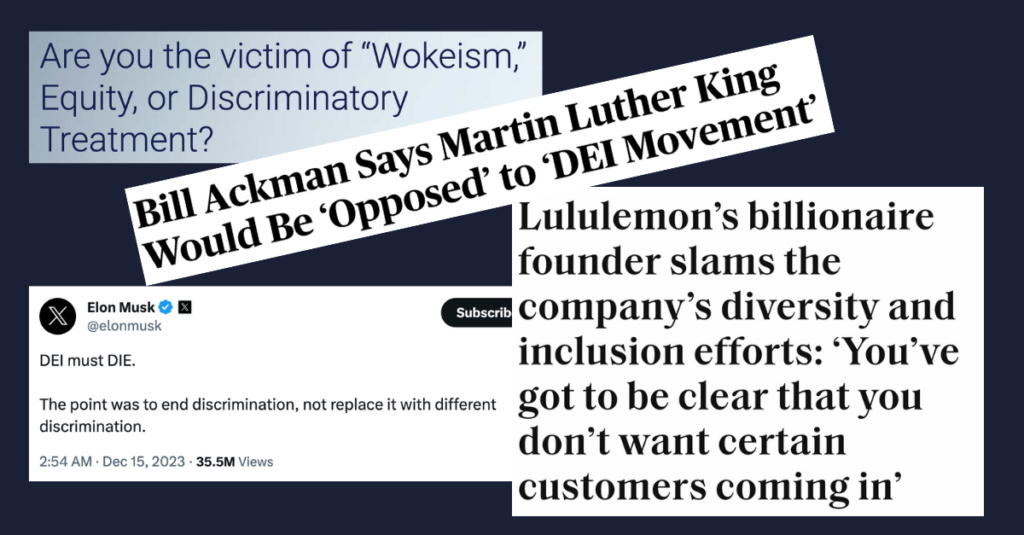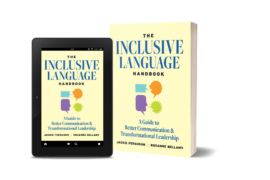DEI is under attack. Politicians and attention-seekers have hijacked the narrative around diversity, equity, and inclusion, blaming the workplace initiatives for a host of problems – from job discrimination to poor hiring choices.

Organizations like American First Legal are promoting the negative narrative with tactics like its hotline that states: “If you have been victimized by woke politics in the workplace or at school, if you have been illegally discriminated against in the workplace or in search of a contract or government benefit under the Orwellian guise of ‘diversity,’ ‘equity,’ ‘inclusion,’ please contact us TODAY.”
“Organizations that never intended to invest fully in DEI efforts are using this type of rhetoric as an excuse to stop DEI initiatives all together,” says Jamie Ousterout, Chief Experience Officer at The Diversity Movement.
It’s unfortunate that opportunistic power-hounds seek to capitalize on the exaggerated grievances of a few, deepening our racial divisions, perpetuating harmful stereotypes, and creating a backlash against people in the LGBTQ+ community. However, just because the voices are loud doesn’t mean they are correct. Those of us who value culture-centric workplaces should listen, but only to decide how we fight back.
Answer the Critics with Facts
To win in the marketplace, business decisions have to be driven by data and facts – not noise and emotion. Future-focused executives, instead of being swayed by the chorus of criticism, should weigh the best course of action for their business. If a leader cares about increasing profits, cutting costs, and decreasing risk, then investing in a culture of belonging ticks all three boxes.
Here are just a few of the dozens of reputable studies proving the benefits of inclusive leadership and diverse, people-centric workplace cultures:
- McKinsey & Company’s December 2023 report, “Diversity Matters Even More,” outlines the “most compelling business case yet” for diversity, noting that executive teams with more gender, racial, and ethnic diversity outperform their peer groups financially.
- Collaborative and respected employees are more productive (unhappy employees cost U.S. companies an estimated $1.9 trillion in 2023, according to Bloomberg).
- Better retention means less turnover and associated costs.
- A more inclusive marketing strategy and more diverse products and services attracts more customers and revenue (for example, people with disabilities have roughly $409 billion in disposable income and LGBTQ+ individuals hold an estimated $3.9 trillion in global purchasing power).
Focus on the Results of DEI, not the Label
But, despite the empirical evidence, business leaders might still be wary of investing in DEI programs, fearing they will expose the company to lawsuits. By avoiding the acronym and emphasizing employee engagement, organizations can achieve culture-building goals without fear of anti-DEI reprisals, and at the same time, protect the company from lawsuits brought by individuals from protected groups. For example, safe and effective options include:
- Expansive recruiting strategies that result in a diverse candidate pool;
- Formal mentoring programs that nurture young professionals;
- Mindful communication techniques that improve team collaboration and efficiency;
- Cross-training that fosters multigenerational cooperation and preserves institutional knowledge; and
- Leadership development to foster trust and belonging in the workplace.
All of these initiatives align with diversity, equity, and inclusion priorities, but they don’t carry any negative baggage. On the contrary, the examples align with business objectives like hiring the best people, retaining top talent, improving teamwork, and boosting productivity. The fact is, helping people understand each other, respect each other, and trust each other is good for employees and good for business.
Unfortunately, in this heated political climate, leaders should still be prepared to defend programs or strategies that give opportunities to individuals from underrepresented groups. Executives who champion equity and inclusion need all the facts they can muster to counter the emotional appeal of grievance politics, racial scapegoating, and divisive disinformation.
Cultural Shifts are Here to Stay: You Can’t Afford to Ignore Them
Consider the rapidly evolving workplace demographics. By 2040 employees who are White will no longer make up the majority of the workforce. This year, Generation Z will overtake baby boomers and by 2025 will comprise a quarter (25%) of the workforce. The significance of this shift for C-suite leaders can’t be understated. Gen Z is the most ethnically diverse generation, more likely to identify as LGBTQ+, believes in the importance of diversity, and expects more from their workplace, especially in terms of inclusive workplace culture, focus on work-life integration, and holistic well-being.
Senior leaders must also be able to navigate cultural differences to survive in the global business economy. Unlike many developed nations, the U.S. population is growing, thanks in large part to immigration. American prosperity relies on immigrant labor and foreign-born entrepreneurs. At large companies, teams are likely to be geographically dispersed and culturally diverse. And in this increasingly connected world of international supply chains and cross-border trade agreements, even small and midsize businesses can’t afford to remain culturally isolated.
Increasing competition puts pressure on customer service and sales teams to ensure clients and customers feel respected. If they feel alienated by your culturally insensitive marketing, they will find other companies to patronize. If shareholders don’t see their values reflected in your Environmental, Social, and Governance (ESG) strategy, they will take their investments elsewhere. If employees don’t feel that they are valued for who they are and their unique contributions, they can’t do their best work and are likely to seek another job.
While we have witnessed backlash and recent attacks on DEI, it’s important to remember that politics and power shift like a pendulum. Strategic decisions should be based on facts and evidence, not the loudest voice. The fact is, diverse teams are here to stay. Leaders need to know how to manage them effectively, and companies need to understand how to leverage their diverse perspectives to tap into innovation. It’s up to savvy executives to continue to champion diversity, equity, and inclusion as a strategy for achieving the organizational outcomes every board demands, and because a high-trust corporate culture is a competitive advantage that will drive business success long into the future.
At The Diversity Movement, we specialize in transforming skepticism into understanding. We work with inclusive leaders to identify the roots of resistance, develop strategies to showcase the value of DEI, and broaden understanding across the organization. Learn how you can navigate DEI resistance and engage in productive conversations.




